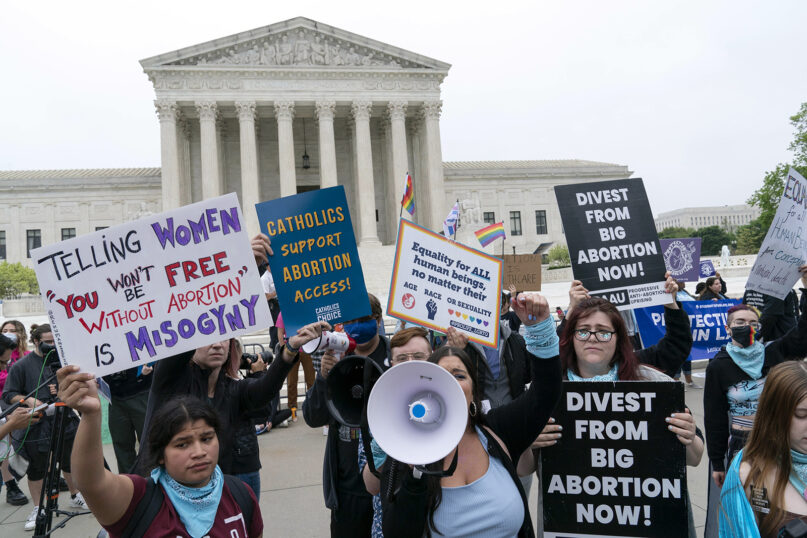(RNS) — For the last 50 years, abortion has been one of the most contentious issues in American political life, fueling mass protests, political machinations and even the rise of Donald Trump, who promised to deliver Supreme Court justices who would overturn Roe v. Wade.
But as Roe’s future is in doubt — according to a leaked draft of a Supreme Court decision — religious Americans have a surprising consensus on the issue.
Most believe abortion should be legal. Most believe there are times when it should not be. And no matter what their views, religious Americans are willing to help friends or family who choose abortion.
Tricia Bruce, a sociologist and researcher affiliated with the University of Notre Dame’s Center for the Study of Religion and Society, says some Americans practice “discordant benevolence” when it comes to abortion.
Though they may believe abortion is immoral and should be restricted, they are also willing to help a friend who chooses to end their pregnancy. This can range from giving emotional support or helping arrange for an abortion to providing financial help.

Tricia Bruce. Photo by Saray Taylor-Roman
Bruce said public polling about American beliefs on issues surrounding abortion sometimes misses the real people who hold those views. Those people, she has argued, often have a series of sincerely held values — such as believing human life begins at conception — and believing they need to stand by their friends.
“Sometimes we take a shorthand approach by using statistics to represent people’s views, and we forget that behind those views is a lot of complexity,” she told Religion News Service in an interview.
In 2019, Bruce and a team of colleagues conducted more than 200 face-to-face interviews with people from six states — California, Colorado, Indiana, North Dakota, Tennessee and Pennsylvania — about the issue of abortion. Each interview lasted more than an hour and was designed to get a deeper view of how Americans see the issue of abortion.
A report based on those interviews found that for many people, abortion is personal as well as political. About a quarter of the females interviewed had had an abortion, while three-quarters of interviewees knew someone who’d had an abortion. Among them was a 58-year-old woman who believes life begins at conception and opposes abortion but also drove a friend to a clinic to get an abortion.
Some people would call that hypocritical, said Bruce. Instead, she sees it as being human and trying to do their best in a difficult situation.
Data from the 2018 General Social Survey shows that Americans from a wide range of faiths say they would be willing to help a close family member or friend who has decided to have an abortion.
RELATED: After winning on abortion, it’s time for Catholic bishops to switch parties
Half of evangelicals (53%), for example, say they would help arrange a ride or childcare for a friend or family member who was having an abortion, while more than a third (38%) would help pay for travel costs. Many nones (the religiously unaffiliated), people from non-Christian faiths, Catholics and Mainline Christians as well as many Black Protestants would do so as well.
Nones (42%), people of non-Christian faiths (44%) and Mainline Christians (36%) would be more likely to help pay for the abortion than Catholics (28%) or Black Protestants (22%), while evangelicals (12%) would be less likely.
Almost all faith groups say they would provide emotional support — from 93% of nones to 81% of evangelicals.
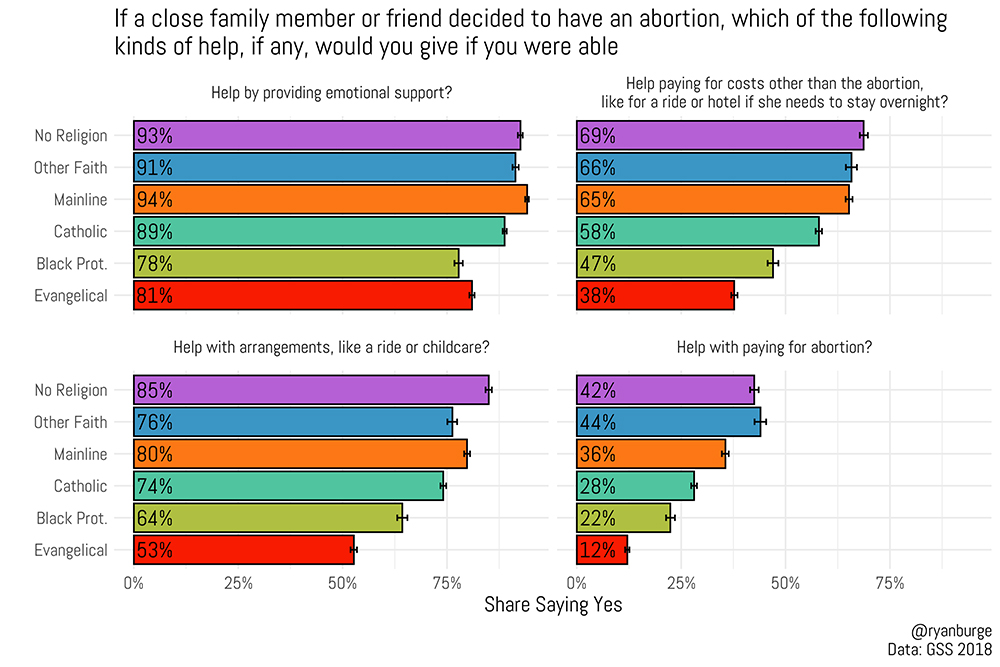
“If a close family member or friend decided to have an abortion, which of the following kinds of help, if any, would you give if you were able” Graphic by Ryan Burge
Providing emotional support could also mean trying to talk someone out of having an abortion and offering them support to choose a different option, said Bruce.
“They may deeply believe the best form of help they can give is to talk their friend out of the abortion or to say things like, ‘I will adopt the baby’ or ‘I’ll find someone who can help you’ or ‘I’ll give you money to raise the child,’” she said.
In the interviews, almost no one took the issue of abortion lightly. Those who had abortions told researchers it had been a difficult experience. They did not regret it, but it was not trivial.
“It’s not Tylenol,” one of the interviewees told researchers.
Researchers also found that people wanted to talk about ways to prevent abortion — better sex education, access to birth control, addressing economic inequality and providing more support for struggling families. Abortion, she said, was seen as the last option.
“None of the Americans we interviewed talked about abortion as a desirable good. Views range in terms of abortion’s preferred availability, justification or need, but Americans do not uphold abortion as a happy event or something they want more of,” according to the report.
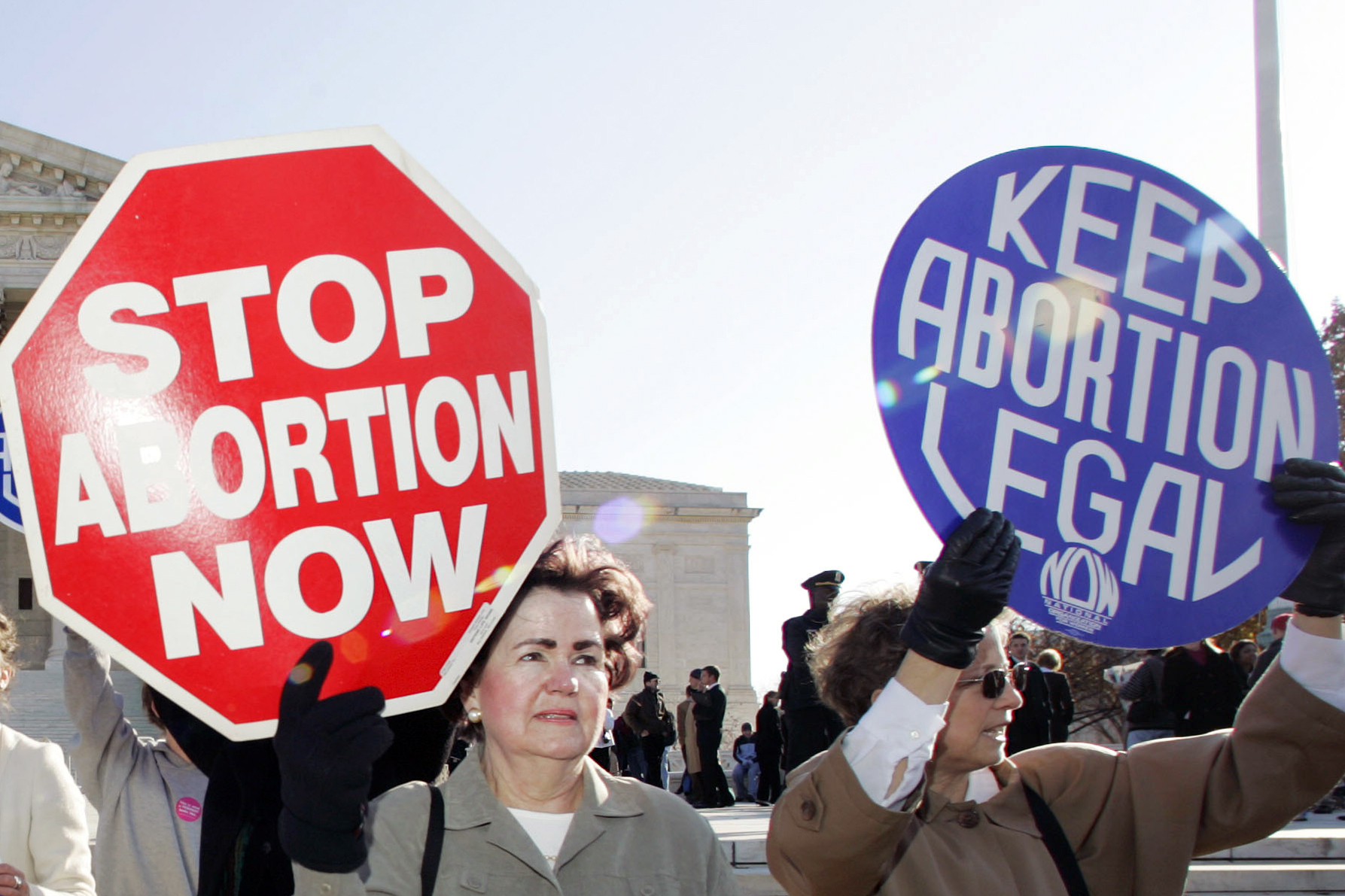
In this Nov. 30, 2005, file photo, an anti-abortion demonstrator stands next to an abortion-rights supporter outside the U.S. Supreme Court in Washington. (AP Photo/Manuel Balce Ceneta)
The possibility that the Supreme Court may overturn Roe comes after decades of falling abortion rates. In 1973, the year Roe v. Wade was decided, 616,000 abortions were reported to the CDC by medical facilities. The figure increased to 1.43 million in the 1990s, before steadily dropping to 612,719 in 2107, with a slight uptick to 625,346 in 2019. Data from the Guttmacher Institute also shows abortion in the United States has been in decline for decades.
If Roe is overturned, state legislatures, rather than the federal government, will play a major role in future regulation of abortion. Some states, like Texas and Tennessee, have already passed so-called trigger laws that would go into effect immediately if Roe v. Wade is overturned and would ban most abortions.
Those laws would likely be commonplace in Bible Belt states, which are controlled by Republicans, many of whom are evangelical Christians and 74% of whom say abortion should be illegal in most or all cases, according to Pew Research Center. Less restrictive laws would likely be passed in states controlled by Democrats, where evangelical Christians are less prominent.
Only 1 in 5 white evangelicals (21%) say abortion should be illegal in all circumstances. That’s higher than other faith groups, such as Catholics (10%) or Black Protestants (6%), but still well short of a majority.
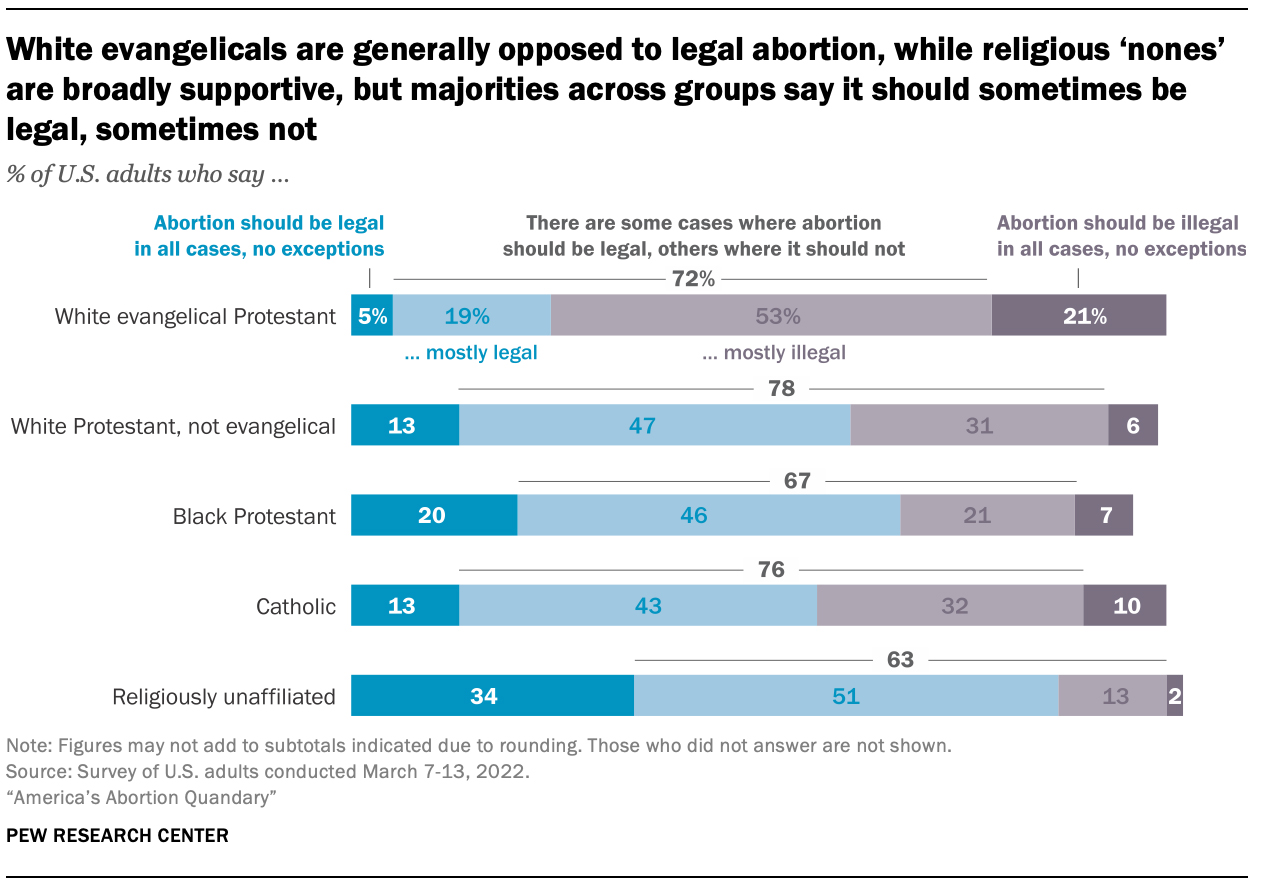
“White evangelicals are generally opposed to legal abortion, while religious ‘nones’ are broadly supportive, but majorities across groups say it should sometimes be legal, sometimes not” Graphic courtesy Pew Research Center
However, the largest Protestant denomination in the United States, the 14 million-member Southern Baptist Convention, passed a resolution at its 2021 annual meeting calling for the abolition of abortion. That resolution calls Roe v. Wade an “iniquitous decision” that “deprived the innocent of their rights, and usurped God.”
“RESOLVED, that the messengers of the SBC meeting in Nashville, Tennessee, June 15-16, 2021, do state unequivocally that abortion is murder, and we reject any position that allows for any exceptions to the legal protection of our preborn neighbors, compromises God’s holy standard of justice, or promotes any God-hating partiality,” the resolution states.
That resolution’s call for complete abolition conflicts with public polling data, which found that evangelicals and religious Americans agree that abortion should be legal in at least some circumstances.
The majority of nones, white non-evangelical Protestants, Black Protestants and Catholics say abortion should be legal if a woman’s health or life is threatened. Half of white evangelicals agree (51%).
Most of those major religious traditions say abortion should be legal in cases of rape, from 87% of nones to 66% of Black Catholics. Only 40% of white evangelicals agree.
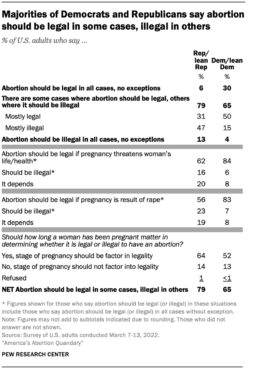
“Majorities of Democrats and Republicans say abortion should be legal in some cases, illegal in others” Graphic courtesy of Pew Research Center
Americans of all backgrounds are more open to restricting abortions later in pregnancy.
“Among men and women, Republicans and Democrats, and Christians and religious ‘nones,’ who do not take absolutist positions about abortion on either side of the debate, the prevailing view is that the stage of the pregnancy should be a factor in determining whether abortion should be legal,” according to the Pew report.
Still, politics plays a significant role in how Americans view abortion. More than half of Republicans say abortions should be mostly (47%) or always (13%) illegal, according to Pew Research. By contrast, most Democrats say abortion should be mostly (50%) or always (30%) legal.
Data from the 2021 Cooperative Election Study and other sources have also found widespread support for abortion rights among many religious Americans.
Atheists (90%), Hindus (88%), Agnostics (84%), Buddhists (87%) and Jews (74%) and those with no particular religion (73%) were most likely to support always allowing a woman the choice of obtaining an abortion, according to the CES. White evangelicals (26%) and Mormons (39%) were less likely to do so. Muslims (66%), mainline Christians (58%) and white Catholics (50%) were more split.
Among Christians, those who attend church services more frequently are more likely to want to see a ban on abortion. That includes about half of white evangelicals (56%), non-white evangelicals (50%), non-white Catholics (54%) and white Catholics (59%).

Ryan Burge. Courtesy photo
Ryan Burge, assistant professor of political science at Eastern Illinois University, said the data shows little support among religious Americans for a total ban on abortion. There is support, he said, for some limits, such as waiting periods, mandatory ultrasounds and banning late-term abortions.
While many religious Americans believe abortion is immoral, they do think it should be legal. And they are often driven more by practicality than ideology, said Burge.
“The average American takes the old Bill Clinton position — abortion should be safe, legal and rare,” he said.
Burge also said many churches — especially large churches — don’t talk much about abortion. That’s in part, he said, because Americans don’t want to talk about abortion. No matter what position church leaders take, someone will be upset.
“It is such a divisive issue,” he said. “In the vast majority of religious contexts, there is no value in bringing it up.”
RELATED: For red-state clergy who back abortion rights, losing Roe is a call to action
Ahead of the Trend is a collaborative effort between Religion News Service and the Association of Religion Data Archives made possible through the support of the John Templeton Foundation. See other Ahead of the Trend articles here.
